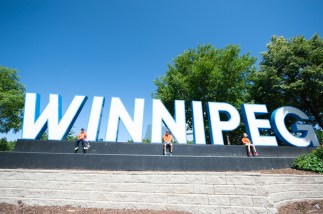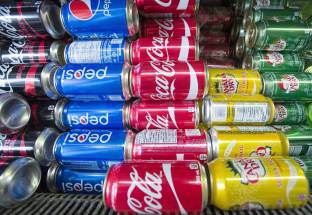Sugary-drink tax deserves consideration
Read this article for free:
or
Already have an account? Log in here »
To continue reading, please subscribe:
Monthly Digital Subscription
$0 for the first 4 weeks*
- Enjoy unlimited reading on winnipegfreepress.com
- Read the E-Edition, our digital replica newspaper
- Access News Break, our award-winning app
- Play interactive puzzles
*No charge for 4 weeks then price increases to the regular rate of $19.00 plus GST every four weeks. Offer available to new and qualified returning subscribers only. Cancel any time.
Monthly Digital Subscription
$4.75/week*
- Enjoy unlimited reading on winnipegfreepress.com
- Read the E-Edition, our digital replica newspaper
- Access News Break, our award-winning app
- Play interactive puzzles
*Billed as $19 plus GST every four weeks. Cancel any time.
To continue reading, please subscribe:
Add Free Press access to your Brandon Sun subscription for only an additional
$1 for the first 4 weeks*
*Your next subscription payment will increase by $1.00 and you will be charged $16.99 plus GST for four weeks. After four weeks, your payment will increase to $23.99 plus GST every four weeks.
Read unlimited articles for free today:
or
Already have an account? Log in here »
Hey there, time traveller!
This article was published 07/09/2022 (1188 days ago), so information in it may no longer be current.
In a province where the rate of Type 2 diabetes in children is among the highest in the world, and where the capital city regularly wears the dubious crown of Slurpee Capital of the World, perhaps it’s time for Manitoba to give serious consideration to a special tax on sugary drinks.
The Newfoundland and Labrador government did it last Thursday, introducing Canada’s first sugar tax, which hikes in-store prices on some sweetened beverages by 20 cents a litre. The way in which this tax was introduced, and the pitfalls it has already encountered, could offer a path forward for provinces such as Manitoba.
While new to Canada, taxes on sugar-sweetened beverages have been introduced in more than 70 countries, and in U.S. cities. All cite a single motivation: to reduce the rates of health dangers such as obesity and Type 2 diabetes by making sugary drinks more expensive.
While no one would argue against better health, the details of the new tax have proven controversial, beginning with which drinks are singled out. In Newfoundland and Labrador, the new tax covers frozen-slush beverages, energy drinks, soda pop and sweetened fruit-flavoured juices and teas. It doesn’t apply to chocolate milk, yogurt drinks, diet drinks containing artificial sweeteners or alcoholic beverages. Critics suggest it would be more consistent to tax all sugary beverages, no exceptions.
While new to Canada, taxes on sugar-sweetened beverages have been introduced in more than 70 countries, and in U.S. cities.
Inevitably, there were also assertions the new levy is just another “government tax grab” but, laudably, Newfoundland and Labrador’s plan will directly fund public-health programs with the tax’s expected annual revenue of $9 million, investing more in school food programs and initiatives for physical activity and prenatal infant nutrition.
What the evidence to date seems to make clear is that taxes on sugary beverages achieve their purpose. The higher prices reduce consumption. Among the reputable public-health research is a two-year academic study comparing Seattle, Wash., where the sugar-sweetened beverage tax was implemented in 2018, and Portland, Ore., which has never had such a tax. Researchers consistently found a reduction of about 23 per in the sale of the taxed beverages, a result in line with studies conducted in other countries.
The finding is worthy of note in Manitoba, where Type 2 diabetes remains a significant health concern. A study in 2020 by the Manitoba Centre for Health Policy, in partnership with the First Nations Health and Social Secretariat of Manitoba, found the number of children diagnosed with Type 2 diabetes rose by more than 50 per cent in the previous decade, with about 83 per cent of diagnosed cases affecting First Nations children.
Ideally, a government-imposed increase in the retail price of sugary drinks will work as it did with tobacco.
Type 2 diabetes is about more than drinking too much soda pop, of course. Other presumed causative factors include smoking, stress, diabetes exposure during pregnancy, and an overall low level of nutrition. But the over-consumption of sugary beverages, which can contribute to obesity, often plays a significant role.
The Manitoba consideration of a tax on sweetened beverages should also include a realistic appraisal of the beverage alternatives in rural communities such as northern First Nations. The goal of better health will remain out of reach as long as a litre of milk is several times more expensive than a litre of Pepsi. There must be healthy and affordable beverage alternatives, including clean drinking water.
Ideally, a government-imposed increase in the retail price of sugary drinks will work as it did with tobacco. As tobacco prices have risen substantially in the past 10 to 20 years, smoking has become less prevalent. Manitoba should seriously consider the merits of a tax-motivated reduction of the harm caused by overconsumption of sweetened beverages.








